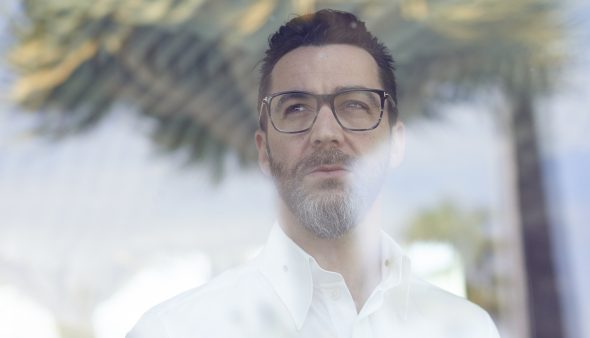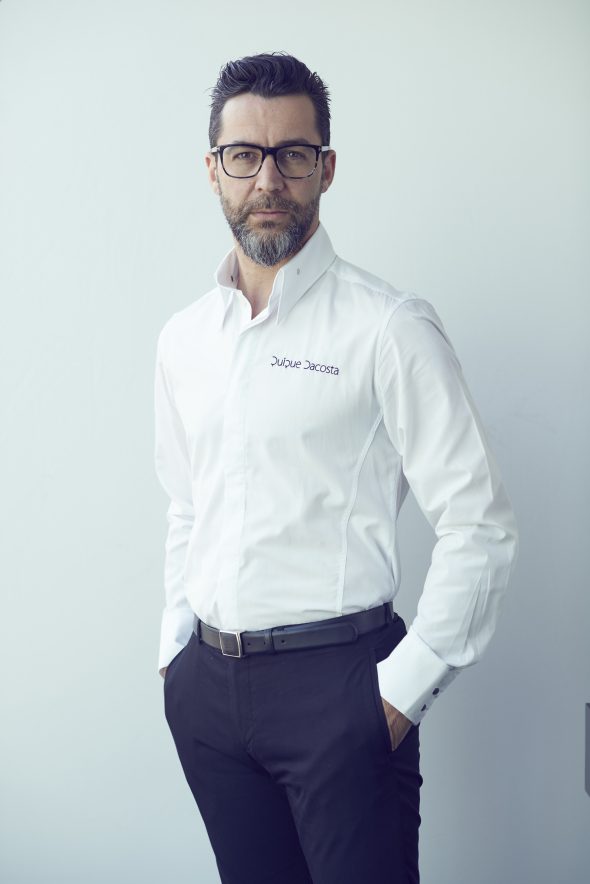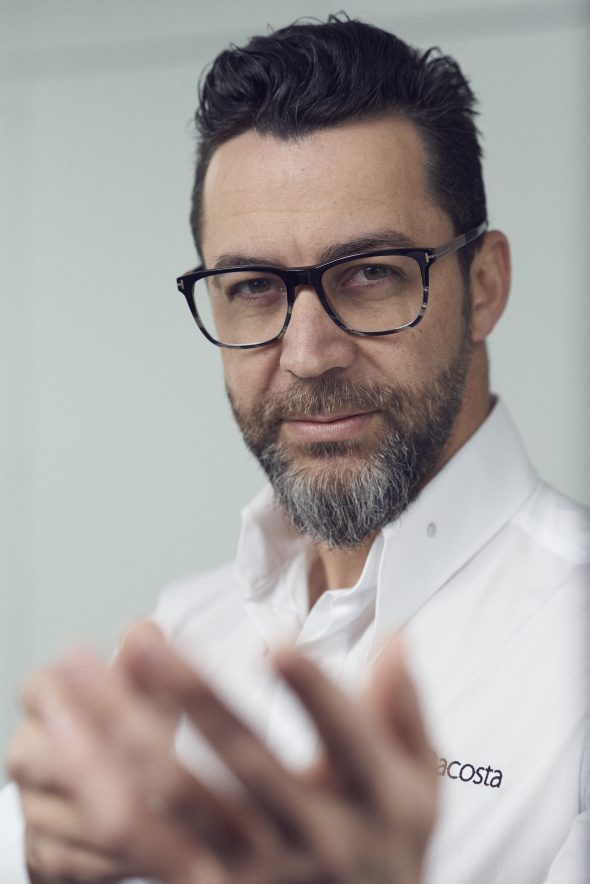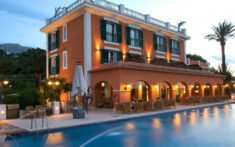Quique Dacosta (Jarandilla de la Vera (Cáceres), 1972) is one of the most prominent and recognized kitchen leading Spanish international representatives. In recent years, domestic and foreign critics have valued their kitchen between the top two in Spain and the five best in the world. Since 1999 accumulates awards and honors for his culinary art, creativity and innovative contributions to the world of haute cuisine avant-garde, including the "Best Chef of the Year", "Best European Chef" or "National Gastronomy Award" granted by highly qualified academies and institutions, guides and specialized media.
Home, Quique Dacosta Restaurant, is one of the ten restaurants of our country awarded the prestigious Two Stars Michelin guide in its edition to 2010, a rating which won first being "Quique Dacosta- El Poblet", in the year 2006. It is also the only restaurant in the Valencia region currently has Three Suns in the Repsol Guide, distinctive gastronomic awarded by the Royal Spanish Academy of Gastronomy and the Brotherhood of the Good Table.
In another creative order, although closely related to the culinary, there are several literary and artistic projects that Quique Dacosta is working on and that will be released this year: “Everyone is very much linked to us and the land we are in. There are two that are great, one in which artists from many fields collaborate and another in which we try to bring our kitchen to the inspiration where it comes from, is something like very rare ... ”. Next to them is the update of his latest book, "Quique Dacosta 2000-2006 Retrospective of dishes, techniques and concepts", with the creations of the 2007 to the 2009, and a publication based on a structured interview based on the issues that have raised Internet users on their website in the last year and a half. Finally, Quique Dacosta tells us about a very curious project, a comic about his work: “It is a comic that Javier Sepúlveda, from Valencia, will develop about our history, to humanize and ironify a bit, because I think it often seems that the world revolves around us and this comic is a way to laugh at ourselves, to take away iron. ”
Since this interview begins, Quique Dacosta Dénia refers to as "my land". He was not born here, but it feels Dianense and more than 20 years established in Dénia ago: "I am of this earth, my wife is here, my daughter was born in Dénia, I am adopted son of this city, I put my life here, in these square meters. " Indeed, in the year 2007 Quique Dacosta was named Adoptive Son of Dénia, "A prize I remember a brutal affection, because the people who were behind the adoption loves me, friends who have fallen by the wayside as Kike Garcia, La Olleta, all cooks Dénia, Hospitality Association and many others made an effort to be recognized me, but had not been necessary for me to feel the warmth of the people. " Moreover, in late November 2009, Quique Dacosta received recognition Valenciano XXI Century, granted by the newspaper Las Provincias.
Path Quique Dacosta, one of the things that is striking is how young he was when he was attracted by the world of cooking. 14 years old when he first came in contact with work in a restaurant, pizzeria Denia in helping began washing dishes, which would pass through different positions to become a chef. When he finished high school at the chabas Historian Institute, between studying architecture or engage in the kitchen, you decide on the latter, "because in addition to understand that I could earn a good living with a restaurant, much I liked this model feed people and I was not wrong. I had read some books chefs who passed way more than cooking, mainly French, because in Spain were published rather Cookbooks and there was more personal, creative or artistic expression. "
To make a living as a cook in this land, Quique Dacosta knew he had to know the cultural base for its gastronomy and made it work in different tapas bars: "Since I came to Denia I like a compressed and intensive memory gustatory and knowledge of traditional dishes; I think the food culture of the people is in the tapas bars, at lunch, in stews, on the plates in the roe, the roe, the 'Prawn amb Bleda' ... not haute cuisine that I created that even then existed in Dénia. "
With 17 he started working in the Restaurant El Poblet Denia, where he knows the hardness of the trade he had chosen. “Baby, what are you doing here? The chef asked me the first day. I start working here, I replied. You don't know what you do, he told me. ” Imagine -continues- a young lad who was going to get into a restaurant with a hierarchical structure of older people, where they worked a lot and very hard, because this job is hard, and then more. I was the last one and on top little one ... and I start eating the same browns as when I entered the pizzeria, doing everything ... it was the beginning. ” After a few months trying to adapt to his new job, Quique Dacosta decides to leave El Poblet, “because the way to take the job in this house at the beginning led me to abort the project and I left the kitchen for nine months, in which I kept reading about I cooked and finally got passionate again and understood that the way to enter a restaurant was much more ambitious than simply learning and staying in a hierarchical structure. To set the tone, I realized that the only way was not to be part of, but to be, ”he says.
So, once cleared their doubts in this period of reflection, Quique Dacosta reorders work in El Poblet. "I take the bar examination and pigheaded, I return to this restaurant. I entered the same game meat in which he had started and I gradually climbing positions in the hierarchical level until the address of the restaurant saw the thrust coming back was more innovative, more hopeful, and the structure that was in the kitchen let me pass. " Since then, Quique Dacosta El Poblet and were one, "forming a tandem with which we were bringing in new directions to the restaurant, to the east, Mediterranean".
Over the years 90, Quique Dacosta focuses on developing a more Mediterranean part in the restaurant kitchen, hitherto specialized in traditional Spanish cuisine. The 92 to 98 is dedicated to making a pure and simple updating of Valencian cuisine: "We took all popular cookbook and reviewed by analyzing points of cooking fat, lightening, shortening cooking fish, seafood; We started making Mediterranean cuisine with local products, leaving always open to products from outside window ".
According to Dacosta, at that time in the haute cuisine there was no Mediterranean cuisine, because the models that are implemented in Spain in the last forty years are of cuisine inspired by France, not in the Mediterranean. “To do this was not so easy,” he argues, “first because the local public was not sure if he wanted to come to a haute cuisine restaurant for the same interpreted dishes he could eat at home on a Sunday. On the other hand, if you are from Paris and they give you an updated Parisian dish, it may seem good to you, but if the trend is Mediterranean, eating fine Mediterranean cuisine in Paris will surely be more snobbish. ”
"I thought that connection to the land was critical and time has proved us right, although at first it could make you lost to an international audience and that local not come".
Year 1998 marks the beginning of a new stage in the kitchen of Quique Dacosta, because it begins to contextualize "a new memory of taste" and avant-garde cuisine: "From the gustatory memory begin to build things that have no precedent nor in our culture and in others. And this is my -clarifica- goal, express myself as an author without references, in quotes, because it is never without references.
All he had done from the 88 98 had basically been to look for referrals and from them I intend to build a new language into the kitchen. And that's the moment that perhaps the world is beginning to notice us, when we started doing different things. "
Quique Dacosta says that the pillars of your kitchen today are the product, 90% local "with him I feel comfortable, because it is what makes me the land where I am, because I have the moral obligation to dignify products of my land, which I understand are the best in their stadium and also the proximity to them makes them even better. That alone cuisine here is different and that differential data must be reflected in the work of the chef ". The second pillar is the cultural base, the gustatory memory, how to eat, to live gastronomy, "life on this earth, as I have lived try to capture in my kitchen and the everyday, the way serving, having the tables, spaces are white, open, are glass, I want light, I'm in the Mediterranean, this will have to reflect ".
The third element is the team, "which is what makes it possible for all materializes and is as important or more than me. Avant-garde cuisine has many stereotypes created as a large plate small portion or much technology is used ... but if it did not need twenty people working with me, because it's all very traditional.
And as technology'll tell you the weirdest device I have in my kitchen is a microwave, "says fun. The fourth pillar is Quique Dacosta and his chief of creativity, "we are who we mark a little that way of understanding cooking. I always speak of an ecosystem Culinaire, which is a spiral that opens and as is opening begins to take products, memories, ways to eat from other cultures.
And the differential data that spiral over other -matiza- is the axis on which it endures, it's me, my way of understanding the kitchen and how to try to pass it on to customers. "
On the customer profile of your restaurant, Quique Dacosta stresses that surprised us the number of young people visiting your site. "Some people tell me, how expensive are !. Caro not answer them, it costs money affirms laughing. Everything in life is a matter of priorities. For some a shirt of € 200 it is normal and a shrimp of Dénia, which has cost 4 euros, it seems expensive ". "In any case -more- young people must be told that enjoy the gastronomic act is not only eating at the restaurant Quique Dacosta, or the Ferran Adrià or Berasategui. A gastronomic event
can be up in the morning and instead of opening a juice you bought in the supermarket, being in a region of oranges, it is to make an orange juice at the time; or instead of buy a muffin or croissant industrial, go to the bakery to buy them freshly made. Gastronomy is analyzed, feeling, sensitivity, not simply feed. The gastronomic act is therefore not a question of money, it is a matter of mentalizing ".
Quique Dacosta believes that to eat well every day will not need much time or money: "I understand that some lentils hard time doing them, but if you organize the can do to eat them the next day, but an asparagus grilled, with a drop of oil and salt, a fried egg, garlic prawns, costs two minutes to do.
When I'm at home, I cook well, with lots of veggies, very simple, very dynamic, with fresh produce. Young people would be amazed if they were Dénia market with € 5 and try to buy things to eat. "
Another substantial difference between traditional cooking and modern cuisine is Quique Dacosta for the recreational component, "fun eating, not only alimentándote by biological necessity. I buy pizza bases and 'tuning', I put them zucchini, finely chopped mushrooms, ham, cherry tomatoes ... game. Or for example, go on a diet by eating vegetables can be great and very funny, but it requires a certain dose of wit, like everything in life. "
Quique Dacosta's career progresses leaving a trail of important awards and recognition inside and outside our borders, which in his opinion "are a consequence of work, never an objective, well maybe three Michelin stars yes, -puntualiza-". "Somebody remembers you in any field he continues to say that you're doing the job well and this is already a recognition. This gives you security, indicates that you're on track but beware, because this is very subjective, what is good for you, maybe for another it is not. Eventually, within all these complexities of personal tastes, phobias and manias, he has been giving us reason. I hope you continue to give us and what is more difficult, from Dénia, from this region, which has a magical culture, but competes with other major regions of Catalonia, Basque Country, Madrid, Asturias, Andalusia ... -. Fight for position on the map your culture, your people, your product, your way of understanding cooking, competing with them is not so easy. " To this end, Quique Dacosta has traveled with his team halfway around the world: "For our kitchen knew I had to cook outside, in San Sebastian, Barcelona, Madrid, Paris, Milan, Alba (Italy), New York, Washington, San Francisco, Tokyo ... and so I've been doing ... life on the road ".
We concluded the interview by asking Quique Dacosta if, in his opinion, anyone who comes to your restaurant is able to appreciate the magic of gastronomic act that provides cutting-edge haute cuisine. "Most importantly, answers us, is to come with open mind-I think that in every person there is a national coach and gastronómico- critical and not try to understand everything, everyone has to measure their own level of happiness."
** Interview magazine Culture-Llunàtics











though perhaps this is an initial focus on the gastronomy I find very interesting congratulate you on your restaurants
At the same time it is nice that you share your knowledge the art of gastronomy is the best
It is certainly one of the best chefs in the community. highly recommended
Hello, just to tell you that I went to your restaurant and I loved it, now due to circumstances they proposed me to write a book and talking about good restaurants, I decided to put yours And another one that I liked. I still have to register the book and after sending it to the publisher, it is titled "THE WIFE OF AN IMAM." Receives a warm greeting
AICHA LOPEZ